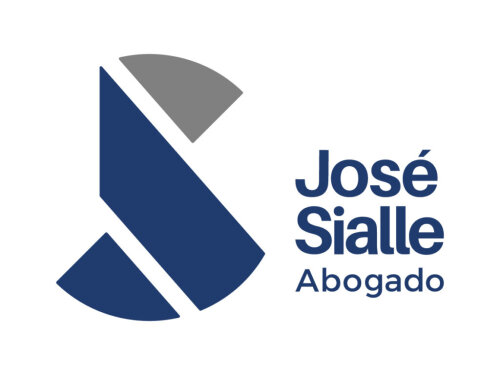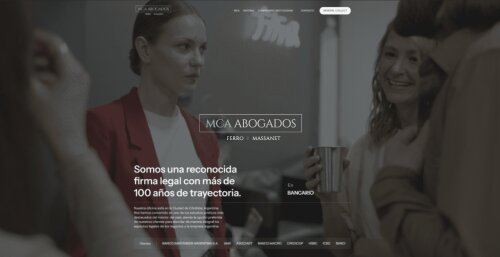Best Lawsuits & Disputes Lawyers in Córdoba
Share your needs with us, get contacted by law firms.
Free. Takes 2 min.
List of the best lawyers in Córdoba, Argentina
About Lawsuits & Disputes Law in Córdoba, Argentina
Córdoba, as a province of the Argentine Republic, resolves civil, commercial, family, labor and administrative disputes through a hierarchical court system made up of first instance courts, appellate courts and the provincial high court. Many substantive rules are set by national laws - for example the Civil and Commercial Code - while procedural rules, court organization and some enforcement mechanisms are established at the provincial level. Common disputes in Córdoba include contract breaches, property and real estate litigation, family matters, consumer claims, labor disputes and administrative appeals against provincial or municipal acts.
Cases can be resolved through litigation or by alternative dispute resolution methods such as mediation and arbitration. Procedural formalities, deadlines and the availability of remedies vary by the type of dispute and by the competent court. Timelines can range from a few months for simple matters resolved through mediation or summary proceedings, to several years for contested cases that go through multiple appeal levels.
Why You May Need a Lawyer
Legal disputes often involve strict procedural rules, formal documents, evidence requirements and deadlines. A lawyer helps protect your rights, advises on strategy, prepares pleadings, represents you in hearings and assists with enforcement of judgments. Examples of common situations where legal help is advisable include:
- Contract disputes where amounts, business reputation or ongoing relationships are at stake - a lawyer can assess breach, damages and remedies.
- Property or real estate conflicts such as title disputes, boundary disagreements, eviction proceedings or issues arising from buy-sell contracts.
- Family law matters including divorce, child custody, visitation, spousal or child support and division of assets - these cases have important procedural safeguards and urgent measures may be needed.
- Labor claims - employers and employees face specialized labor courts and strict procedural rules for claims like wrongful dismissal, unpaid wages or social security contributions.
- Consumer complaints against companies for defective products, misleading advertising or unfair contract terms - specialized protections may apply and administrative procedures can be pursued alongside court claims.
- Administrative or municipal disputes - when you seek to challenge a provincial or municipal administrative act, you will need to navigate administrative procedures and judicial review rules.
Local Laws Overview
Key legal frameworks and practical features you should know when dealing with lawsuits and disputes in Córdoba include:
- Mixed national and provincial rules - Substantive private law is largely governed by the National Civil and Commercial Code and other national statutes. Procedural aspects, court organization and enforcement are regulated by provincial procedure codes and local regulations.
- Specialized courts - Córdoba has distinct jurisdictions for civil and commercial matters, family law, labor courts, administrative chambers and small claims or justice of the peace forums for lower-value disputes.
- Mediation and pre-claim conciliation - Many civil and commercial disputes require or strongly encourage mediation or conciliation before a judge accepts a case. Local rules determine which matters need pre-filing mediation and which are exempt.
- Evidence and testimony - Argentine procedure relies on written pleadings, documentary evidence, witness testimony and expert reports when necessary. Timing and admissibility rules are strict, so early collection and proper submission of evidence is critical.
- Statutes of limitation - Prescription periods vary according to the type of action. Some claims must be brought within months, others within years. Missing a deadline can bar a claim, so early legal review is essential.
- Fees and costs - Attorney fees may be agreed privately - for example fixed fees, hourly rates or contingency arrangements where allowed - and courts may also apply scales for fee calculation. The losing party may be ordered to pay court costs and partial attorneys fees, but local practice varies.
- Enforcement - Winning a judgment is not always the end. Argentina has mechanisms for execution of judgments - wage garnishment, attachment of bank accounts, auction of assets - but enforcement can be complex and may require additional procedures at the enforcement stage.
Frequently Asked Questions
How do I know which court has jurisdiction over my dispute?
Jurisdiction depends on the type of claim, the parties involved and the amount or subject matter. Civil and commercial disputes typically go to civil and commercial courts; labor claims to laboral courts; family matters to family courts; and administrative challenges to administrative tribunals. Location rules commonly use the defendant's domicile or the place where the obligation should have been performed. A lawyer can determine the correct forum and avoid dismissal for lack of jurisdiction.
Is mediation mandatory before filing a lawsuit in Córdoba?
Many disputes require prior mediation or conciliation, but the requirement depends on the matter and the applicable provincial rules. Consumer, family and many civil or commercial cases often have pre-filing mediation stages. If mediation is mandatory and you file without completing it, the court may reject the claim until mediation is attempted. Check local rules or consult an attorney to confirm requirements for your case.
How long will a civil lawsuit take from filing to final decision?
There is no fixed duration. Simple cases settled in mediation may close in weeks or months. Contested cases at first instance typically take many months to a few years. If appeals are filed, the process can extend further. Timelines depend on court workload, complexity of evidence, whether urgent or precautionary measures are requested, and the parties' approach to settlement.
What documents should I bring to my first appointment with a lawyer?
Bring all documents related to the dispute - contracts, invoices, receipts, correspondence (emails, messages), bank records, court or administrative notices, expert reports and any prior legal steps taken. Also prepare a concise timeline of events and the names and contact information of other parties or potential witnesses. This helps your lawyer assess merits, deadlines and strategy.
Can I get legal aid if I cannot afford a private lawyer?
Yes. Córdoba has public legal assistance for people who cannot afford private counsel. Different institutions provide services based on the case type - for criminal defense, the public defender system; for civil matters, free legal clinics at universities and public legal aid offices. Eligibility depends on income, case nature and other criteria. A local lawyer or the provincial bar association can point you to the right service.
What are provisional or precautionary measures and when are they used?
Precautionary measures are urgent court orders designed to preserve rights or evidence while a main case proceeds - for example injunctions, asset freezes, provisional custody or measures to prevent destruction of goods. They are used when delay would cause irreparable harm and require showing urgency and a plausible right. These measures are available in civil, family and commercial proceedings and can be decisive for protecting your position early on.
Are contingency or success-fee arrangements allowed in Córdoba?
Contingency agreements - where a lawyer's fee depends on the outcome - are used under certain limits and must comply with professional ethics and local regulations. Parties typically put fee arrangements in writing, specifying percentages or conditions. It is important to have a clear written retainer that covers fees, costs and what happens if you lose.
How do appeals work if I lose at first instance?
After a judgment at first instance, the losing party may appeal to the appropriate appellate chamber within a set deadline. Appeals generally focus on legal or procedural errors and, depending on the case, may lead to reversal, modification or rehearing. Higher appeals to the provincial supreme court are possible but limited to matters of legal importance or constitutional questions. Appeals usually extend overall resolution time and add complexity.
Can foreign judgments be enforced in Córdoba?
Foreign judgments may be recognized and enforced in Argentina under certain conditions - notably that jurisdiction was proper, due process was observed, and the judgment does not conflict with Argentine public order. The foreign ruling generally needs to be validated through a local judicial procedure before enforcement. Enforcement of foreign judgments can be complex, so early legal advice is essential.
What should I consider when choosing a lawyer in Córdoba?
Look for experience in the specific area of law relevant to your dispute, local courtroom experience, clear communication, a written fee agreement and a strategy that fits your goals. Verify professional standing with the Colegio de Abogados de la Provincia de Córdoba or the local bar association, ask for references or past case types handled, and confirm how the lawyer will keep you informed about progress and costs.
Additional Resources
Poder Judicial de la Provincia de Córdoba - provincial court system and court directories where you can identify specific courts and chambers handling your case type.
Corte Suprema de Justicia de la Provincia de Córdoba - the provincial high court, which handles appeals on matters of provincial law and constitutional issues within the province.
Ministerio Público Fiscal de la Provincia de Córdoba - public prosecutors office, primarily for criminal matters but also a point of contact for public interest issues.
Defensoría General y Defensores Oficiales - public defender offices offering legal defense for those who qualify, especially in criminal cases.
Colegio de Abogados de la Provincia de Córdoba - the provincial bar association where you can verify lawyer credentials, find directories and learn about professional rules.
Oficina de Defensa del Consumidor - provincial and municipal consumer protection offices that handle complaints and administrative remedies against businesses.
Universidad Nacional de Córdoba - Faculty of Law clinics and legal aid programs provide free or low-cost legal assistance and may offer advice or representation for qualifying cases.
Cámara de Comercio de Córdoba and local arbitration or mediation centers - offer alternative dispute resolution services for commercial conflicts, including institutional arbitration and mediation programs.
Defensoría del Pueblo and Ombudsman offices - public institutions that can advise on administrative rights and systemic issues affecting groups or the public at large.
Next Steps
1. Gather documentation - collect contracts, invoices, messages, bank records and any written evidence that supports your claim. Create a clear timeline of relevant events.
2. Note deadlines - identify any urgent deadlines or prescription periods. If you suspect a running limitation period, seek immediate legal advice to avoid losing rights.
3. Seek an initial consultation - schedule a meeting with a lawyer experienced in the type of dispute you face. Use that meeting to assess merits, costs, timelines and possible alternatives such as mediation.
4. Consider alternative dispute resolution - evaluate mediation or arbitration if appropriate. These routes can be faster and less costly than full litigation and are often required before filing a lawsuit.
5. Confirm fees and get a written engagement - before proceeding, clarify fee structure, billing practices and who will handle the case. Insist on a written retainer that explains responsibilities and costs.
6. If you cannot pay, explore legal aid - contact university legal clinics, public defender offices or consumer protection agencies to identify available free or low-cost assistance.
7. Follow court instructions and preserve evidence - comply with procedural requirements, attend hearings, and preserve or secure evidence, witnesses and expert reports as advised by your lawyer.
8. Stay informed and communicate - maintain regular communication with your lawyer, ask for clear explanations of strategy and possible outcomes, and make informed choices about settlement offers or appeals.
Legal disputes can be stressful and technical. Early, competent advice and prompt action improve your chances of a favorable result. If you have a dispute in Córdoba, arrange a consultation with a qualified local attorney to evaluate your options and next steps.
Lawzana helps you find the best lawyers and law firms in Córdoba through a curated and pre-screened list of qualified legal professionals. Our platform offers rankings and detailed profiles of attorneys and law firms, allowing you to compare based on practice areas, including Lawsuits & Disputes, experience, and client feedback.
Each profile includes a description of the firm's areas of practice, client reviews, team members and partners, year of establishment, spoken languages, office locations, contact information, social media presence, and any published articles or resources. Most firms on our platform speak English and are experienced in both local and international legal matters.
Get a quote from top-rated law firms in Córdoba, Argentina — quickly, securely, and without unnecessary hassle.
Disclaimer:
The information provided on this page is for general informational purposes only and does not constitute legal advice. While we strive to ensure the accuracy and relevance of the content, legal information may change over time, and interpretations of the law can vary. You should always consult with a qualified legal professional for advice specific to your situation.
We disclaim all liability for actions taken or not taken based on the content of this page. If you believe any information is incorrect or outdated, please contact us, and we will review and update it where appropriate.
Browse lawsuits & disputes law firms by service in Córdoba, Argentina
Córdoba, Argentina Attorneys in related practice areas.












